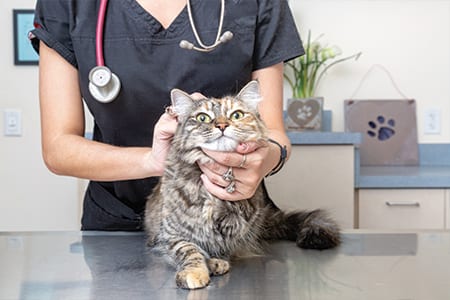 An annual wellness exam is recommended for all dogs and cats 1 year of age and older. More frequent exams may be recommended for senior and geriatric pets or those having medical or behavioral issues.
An annual wellness exam is recommended for all dogs and cats 1 year of age and older. More frequent exams may be recommended for senior and geriatric pets or those having medical or behavioral issues.
Why Do Pets Need an Annual Wellness Exam?
Annual wellness exams give you a baseline for what is normal for your pet’s health so you can readily see any changes from the previous year. Yearly checkups can lengthen your pet’s life expectancy by addressing health issues early on before they become more serious and advanced, resulting in them being more difficult to treat. Your veterinarian will be able to detect and treat any new health problems or chronic conditions that might have otherwise been missed or delayed if you had waited.
Annual wellness visits are considered nose-to-tail physical exams for your dog or cat, where your vet will check the following:
- Mouth, teeth and gums for disease and tooth decay
- Eyes and ears for infections, inflammation, drainage
- Nose for congestion or drainage
- Heart for murmurs or abnormal sounds and rhythms
- Lungs for respiratory congestion or abnormalities
- Kidneys are manually checked for pain, sensitivity and size
- Skin is checked for any sign of skin disease, lesions, abnormal bumps or growths
- Fur is checked for flea dirt and fleas, as well as the condition of the coat
- Leg joints for range of movement
- Internal organs will be palpated for any signs of abnormalities or problems
- Your pet’s bottom will be checked for any sign of infection or intestinal worms, which might include a rectal exam for any impaction.
Following the exam, laboratory tests may be recommended. Your vet may want to do a Complete Blood Count or Blood Chemistry Panel for a baseline or to diagnose a particular concern. In addition, a Urinalysis may be done if your pet is older or your vet is concerned about a possible bladder, kidney infection or kidney disease.
Heartworm Testing
The American Heartworm Society (AHS) advises that all dogs and cats be tested annually for heartworm infection, even if your pet is on a heartworm preventive. The AHS recommends this conservative approach due to reports of animals on preventives that contracted heartworms. Annual testing ensures that if there is an infection it is caught in plenty of time to effectively manage it.
Intestinal Parasite Testing
Regular deworming and fecal examinations are recommended by the American Association of Veterinary Parasitologists (AAVP), the Centers for Disease Control and Prevention (CDC), and the Companion Animal Parasite Council (CAPC).
Senior or Geriatric Pet Wellness Exams
Pets under the age of 7 years old should have annual wellness exams unless there’s a medical or behavioral issue. However, once your pet companion reaches 7 years of age or older, he or she should be evaluated every six months to be on the safe side.
For senior and geriatric pets, it’s even more important to visit your vet and run routine diagnostic tests. Your older pet can be dealing with multiple health issues, each of which should be addressed to make your pet more comfortable by reducing any suffering and pain, and giving them greater quality of life. Pets over 7 years of age are more prone to kidney and thyroid disease, diabetes if they are obese, arthritis and joint problems, dental needs, infections, and other possible underlying issues. Since our pets can’t tell us what is bothering them, we often don’t pick up on an issue until it has progressed to the point that our pet begins to show signs. So after the age of 7, coming in every 6 months provides the opportunity to ensure your pet is in the best health possible.
In summary, a wellness check along with recommended blood screening in older animals, vaccinations, heartworm testing and parasite control will help your pet live a happier, longer life and be the best companion he or she can be to you and your family.

